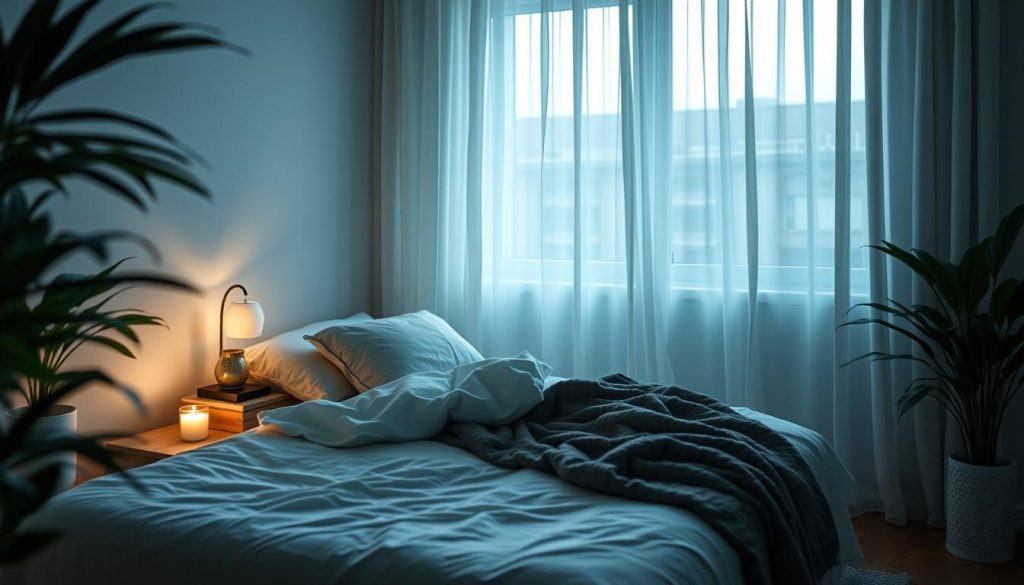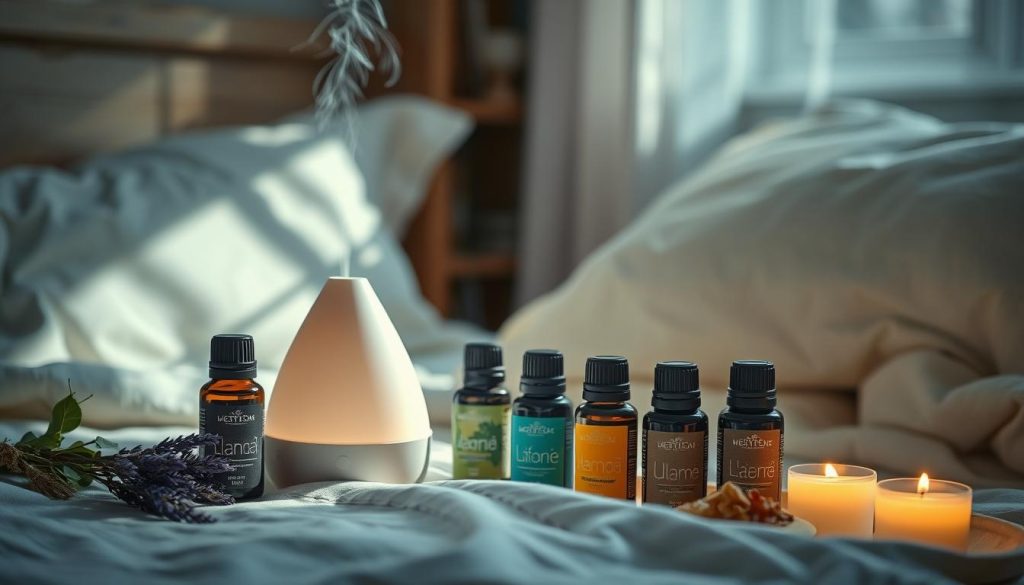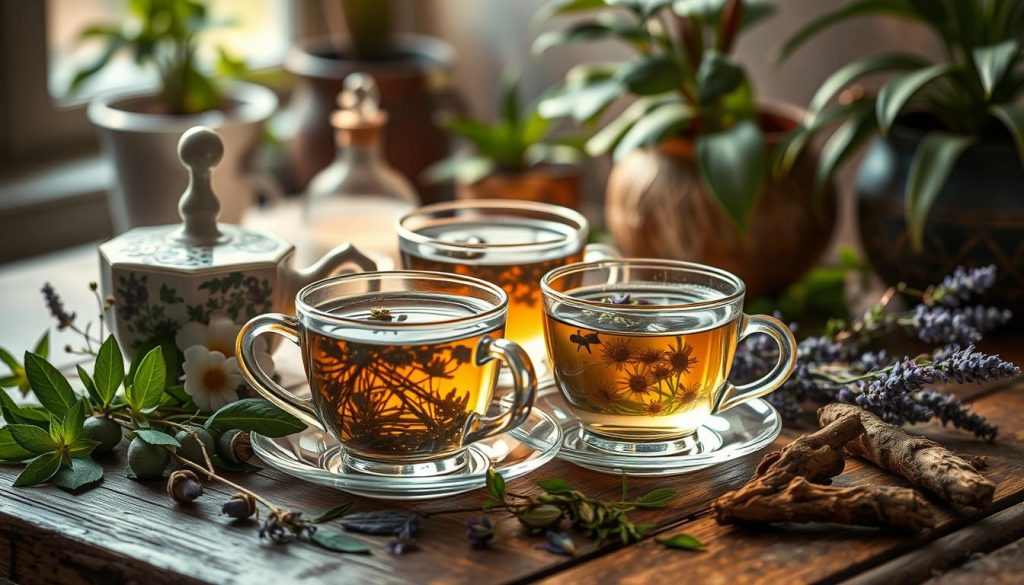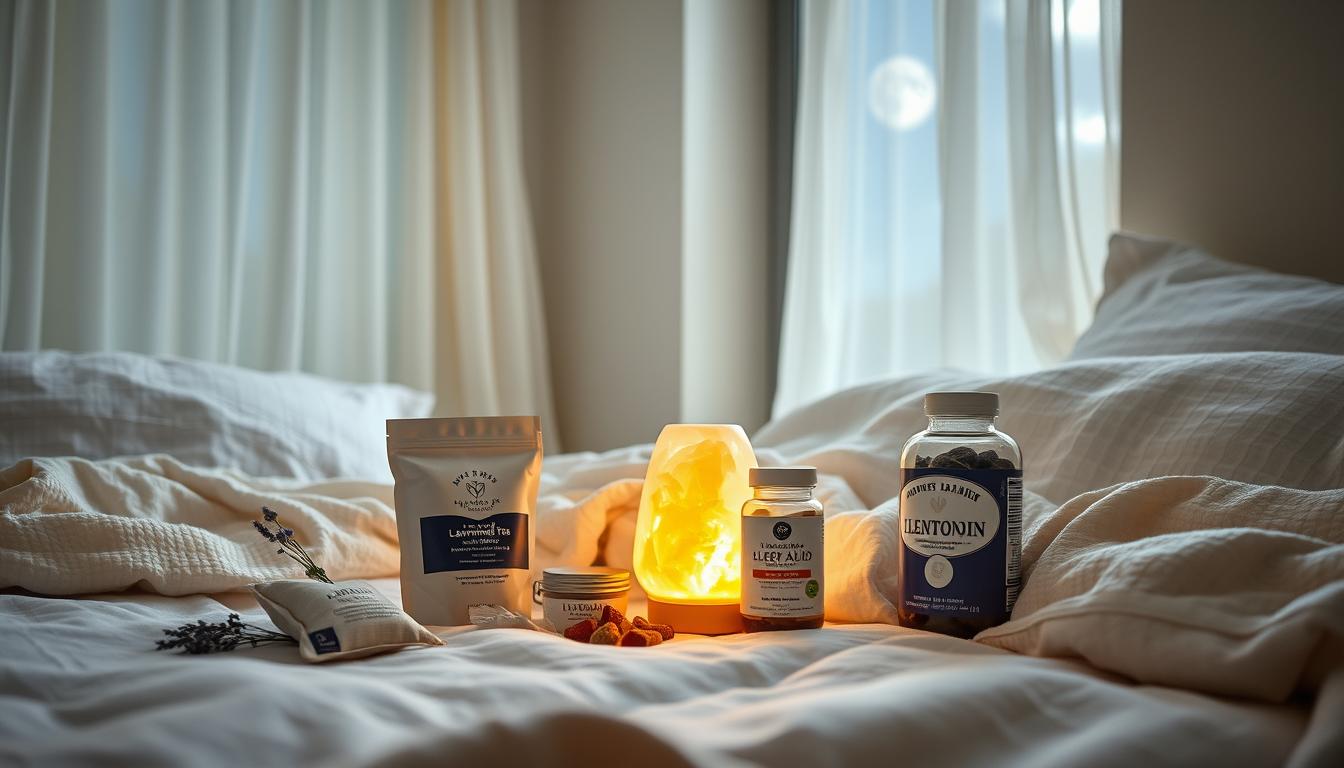We’ll look at natural sleep remedies to help you sleep well without medicine. You’ll learn about calming bedtime routines and the benefits of aromatherapy. These methods can improve your sleep quality and last longer. They’re great for anyone who has trouble sleeping sometimes or all the time.
Our busy lives can make it hard to get enough sleep. But, there are natural ways to sleep better without medicine. By trying these methods, you can sleep better and feel great in the morning.
Establish a Calming Bedtime Routine
To get better sleep, having a regular bedtime routine is key. Adding relaxing activities to your evening can help your body and mind relax. Let’s look at some ways to wind down and make your sleep space better.
Relaxing Activities to Wind Down
Doing calming things before bed tells your body it’s time to relax. Try gentle yoga or light stretching to loosen muscles and calm your mind. Meditation and deep breathing can also help reduce stress and anxiety, making it easier to sleep.
Reading a book or listening to soft music are great ways to unwind. But, avoid using electronic devices or watching TV as they can mess with your sleep cycle.
Create a Sleep-Conducive Environment
The place where you sleep is very important for good rest. Make your bedroom cool, dark, and quiet. Keep the room at a comfy temperature and use blackout curtains or an eye mask to block light.
Use a white noise machine or earplugs to reduce noise. Also, make sure your bed is comfy and supports your spine well. This can help you fall asleep and stay asleep.
| Bedtime Routine for Better Sleep | Relaxation Techniques Before Bed | Creating a Sleep-Conducive Environment |
|---|---|---|
| Establish a consistent sleep schedule | Gentle yoga or light stretching | Adjust the temperature to a comfortable level |
| Engage in calming activities | Meditation and deep breathing exercises | Use blackout curtains or an eye mask |
| Avoid stimulating activities before bed | Read a book or listen to soothing music | Minimize noise disturbances with white noise or earplugs |

By having a calming bedtime routine, doing relaxing activities, and making your sleep space comfy, you can get a better night’s sleep.
Harness the Power of Aromatherapy
Aromatherapy is a natural way to help you sleep better. Certain essential oils and scents calm the mind and body. They are great for a good night’s sleep. Let’s look at the best essential oils for sleep and how to use them.
Lavender oil is famous for helping you sleep. Its smell lowers your heart rate and blood pressure. This makes you feel calm and ready for sleep. Try diffusing lavender oil in your room or rubbing it on your temples before bed.
Chamomile oil also helps you sleep better. It’s a calming scent that has been used for ages. Chamomile has a chemical that makes you feel less anxious and sleepy.
- Diffuse chamomile oil in your bedroom for a calming ambiance.
- Add a few drops to your bath or massage it into your skin for a soothing, pre-bedtime ritual.
Cedarwood oil is another great choice for sleep. Its smell lowers stress hormones that can keep you awake. Place a cotton ball with cedarwood oil near your pillow for a peaceful night.

Using these natural scents in your bedtime routine can change your sleep for the better. Aromatherapy creates a calm space for sleep. Get ready for sweet dreams!
Natural Sleep Remedies and Herbal Teas
Looking for a natural way to sleep better? Herbal teas and supplements are great options. Chamomile and valerian root are two popular choices. They help you sleep well.
Chamomile: A Gentle Sedative
Chamomile is a favorite for calming and helping you sleep. Drinking chamomile tea before bed relaxes your mind and body. It makes falling asleep easier.
Chamomile has apigenin, which acts as a mild sedative. Studies show it can improve sleep quality, especially for those with mild insomnia.
Valerian Root: Nature’s Tranquilizer
Valerian root is another natural sleep aid. It’s been used for centuries to treat insomnia. It’s a stronger sedative than chamomile.
Valerian increases GABA in the brain, which helps you relax. Many people find it helps them sleep better. But, research on valerian is mixed.
Choosing chamomile tea or valerian root supplements can help you sleep better. Always talk to your doctor before trying new supplements. Remember, consistency is key for better sleep.

Practice Mindfulness and Deep Breathing
Getting good sleep is not just about the right bed. It’s also about a calm mind and less stress. Mindfulness and deep breathing can help you relax and sleep better.
Quieting the Mind for Better Sleep
Mindfulness means being fully in the moment. It’s great for stopping thoughts that keep you awake. By focusing on your breath or a simple word, you can calm your mind.
Deep breathing is also good for sleep. Slow, deep breaths can calm your body. This can help you sleep better and stay asleep.
- Try a simple mindfulness meditation before bed, focusing on your breath or a calming word or phrase.
- Practice deep breathing exercises, such as the 4-7-8 method, where you inhale for 4 seconds, hold for 7 seconds, and exhale for 8 seconds.
- Experiment with different relaxation techniques to find what works best for you and your sleep patterns.
Adding mindfulness and deep breathing to your bedtime routine can help. It can quiet your mind, reduce stress, and prepare you for a good night’s sleep. Try these methods and see how they work for you.
Optimize Your Sleep Environment
Creating a sleep-friendly bedroom is key for quality sleep. Focus on the environmental factors that affect sleep. This will help you sleep better and wake up feeling great. Here are some tips for a better sleep environment.
Lighting Matters
The lighting in your bedroom is very important. Try to keep it dark with blackout curtains or shades. Use dimmers or soft, amber lights to help you sleep.
Temperature and Comfort
The best bedroom temperature is between 65°F and 70°F. Make sure your room is well-ventilated. Choose comfy, breathable bedding and a good mattress for a cozy sleep space.
Noise Control
It’s important to keep your bedroom quiet. Use white noise machines, earplugs, or soundproofing. Try to place your bed away from noisy areas.
| Environmental Factor | Optimal Conditions for Sleep |
|---|---|
| Lighting | Dim, amber-hued lighting or complete darkness |
| Temperature | 65°F to 70°F (18°C to 21°C) |
| Noise | Quiet, with minimal external sounds |
| Bedding | Comfortable, breathable, and supportive |
By improving these factors, you can make your bedroom better for sleep. Try different things to find what works best for you.
Lifestyle Adjustments for Sounder Slumber
Changing our lifestyle can help us sleep better. We can make our daily routines, exercise, and diet better. This can improve our sleep quality and how long we sleep.
Regular exercise is key for better sleep. It reduces stress and helps our body get ready for sleep. Try to do 30 minutes of moderate exercise like brisk walking or yoga each day.
What we eat affects our sleep too. Avoid heavy, spicy, or sugary foods before bed. Instead, eat sleep-friendly snacks like almonds, chamomile tea, or whole-grain cereal. These small changes can make a big difference in how well we sleep.

